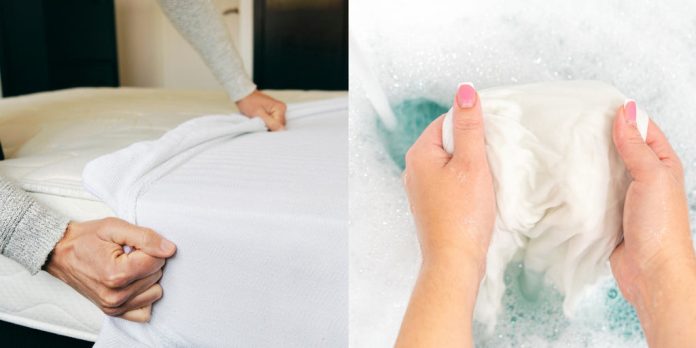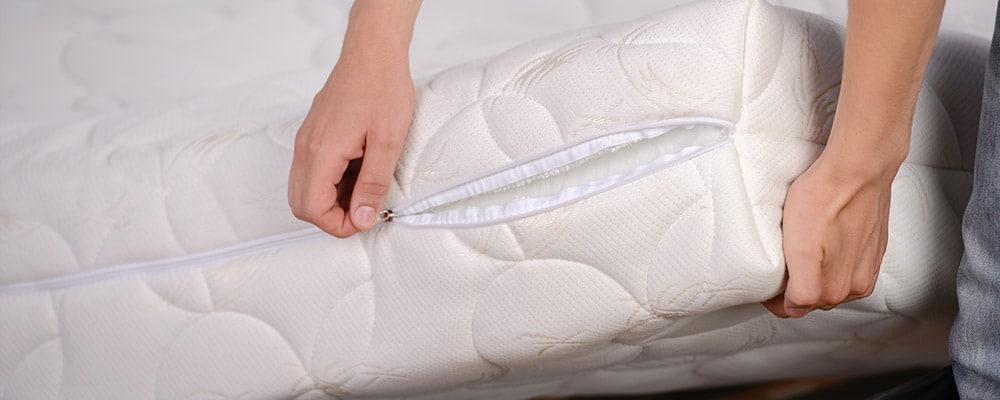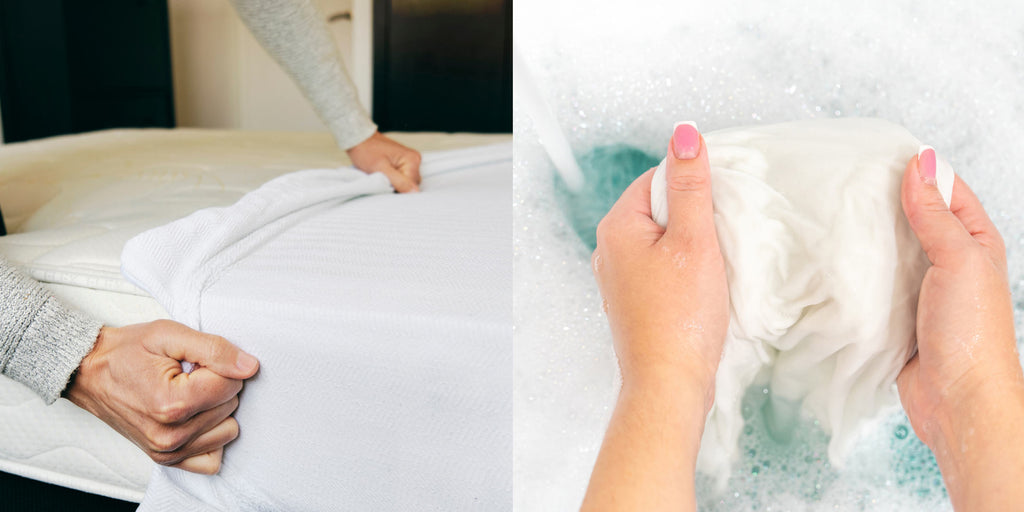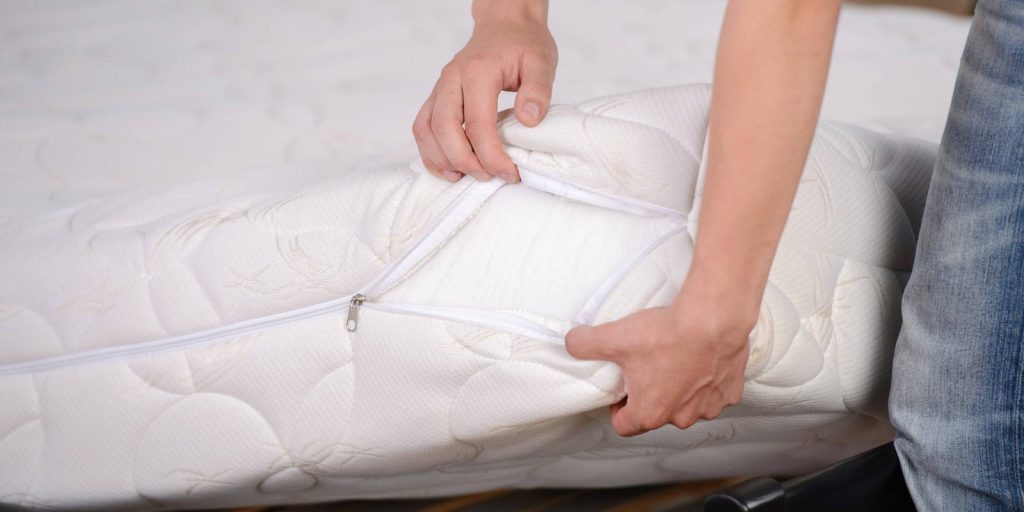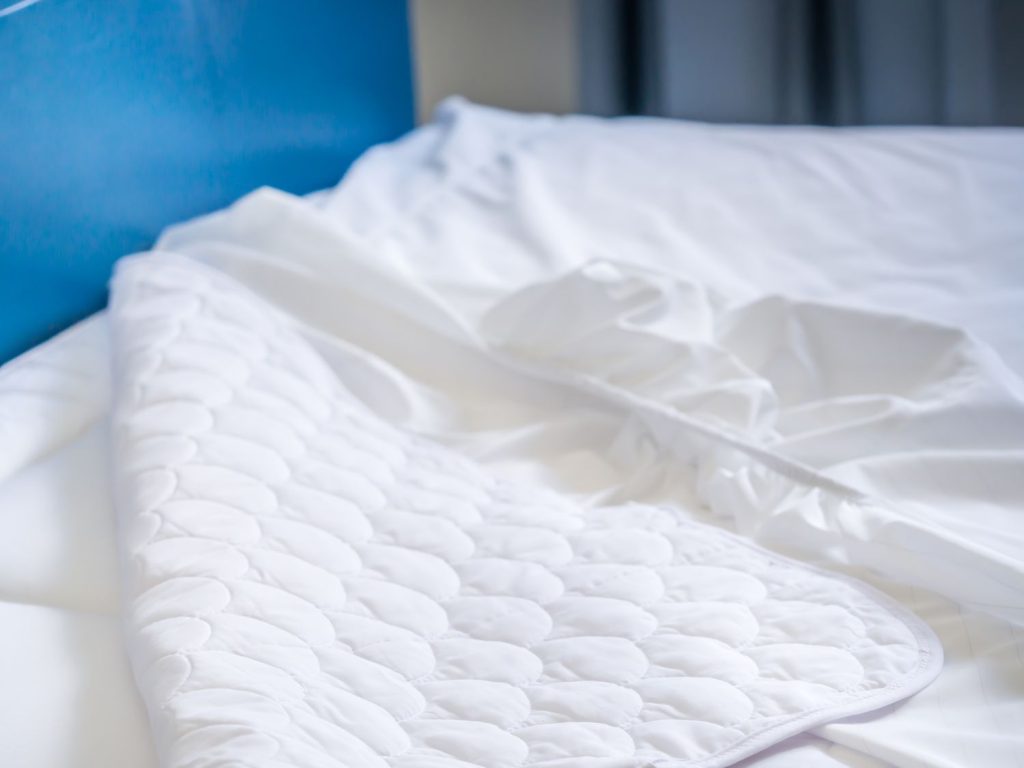Let’s talk about the often-overlooked necessity of washing your mattress protector. We all know the importance of keeping our sheets clean, but what about the layer that shields our mattress from spills, stains, and allergens? Many of us may not even think about it, but taking the time to regularly wash your mattress protector can have a significant impact on hygiene, comfort, and overall quality of sleep. In this article, we will explore the reasons why you should consider washing your mattress protector every time and the benefits it can bring to your sleep environment. So, let’s dive in and discover why this simple task can make a big difference in your nightly rest.
Review contents
The Importance of Washing Mattress Protectors
Why washing mattress protectors is necessary
Keeping our mattresses clean and hygienic is vital for our overall well-being. Mattress protectors play a crucial role in maintaining the cleanliness and longevity of our mattresses. But simply using a mattress protector is not enough; regular washing of these protectors is equally important to ensure optimal protection and comfort. By regularly washing mattress protectors, we can enhance their effectiveness, keep our mattresses free from stains, odors, allergens, and dust mites, and prolong the life of our mattresses.
Benefits of regularly washing mattress protectors
Regularly washing mattress protectors offers numerous benefits that contribute to our comfort and health. First and foremost, it helps to prevent the buildup of stains and spills that can penetrate through the protector and reach the mattress. By washing the protector, we remove any existing stains and ensure a clean and fresh surface for our sleep. Additionally, regular washing removes any odors that may develop over time, ensuring a pleasant and fresh sleeping environment. Washing mattress protectors also helps to eliminate dust mites and allergens that may accumulate on the surface, reducing the risk of allergies and respiratory issues.
Impact of not washing mattress protectors
Neglecting to wash mattress protectors can have adverse effects on our sleep quality and overall health. Without regular washing, stains and spills can penetrate the protector and reach the mattress, potentially causing permanent damage. The accumulation of dust, allergens, and dust mites can trigger allergies and respiratory issues, making our sleep uncomfortable and disturbing our overall well-being. Neglected mattress protectors can also harbor unpleasant odors, leading to a less inviting sleeping environment. Moreover, failing to wash mattress protectors can significantly decrease their lifespan, requiring more frequent replacements and additional expenses.
Frequency of Washing
Manufacturer’s recommendations
To ensure the optimal performance and longevity of mattress protectors, it is advisable to refer to the manufacturer’s recommendations regarding washing frequency. Manufacturers often provide specific guidelines on the label or accompanying instructions to help users maintain their products effectively. Following these guidelines will ensure that we are cleaning our mattress protectors in accordance with the manufacturer’s specifications, providing the best care for our investment.
Frequency based on personal preferences
While it is important to consider the manufacturer’s recommendations, personal preferences also play a role in determining the frequency of washing mattress protectors. Factors such as lifestyle, habits, and climatic conditions can influence how often we should wash our protectors. For individuals with allergies or sensitive skin, more frequent washing may be necessary to minimize potential irritants. Similarly, those living in humid climates or experiencing regular spills may need to wash their protectors more frequently to prevent the growth of mold and mildew.
Factors influencing washing frequency
Several factors can impact the frequency at which we should wash our mattress protectors. The presence of children or pets in the household may result in more frequent stains and spills, necessitating more regular washing. Additionally, individuals who sweat excessively during sleep or have oily skin may want to consider washing their protectors more often to maintain freshness. Environmental factors, such as high humidity or a dusty environment, can also influence the need for more frequent washing. Being mindful of these factors will help us determine the most suitable washing frequency for our mattress protectors.
This image is property of beloitmattress.com.
Signs it’s Time to Wash
Visible stains or spills
One of the most obvious signs that it’s time to wash our mattress protectors is the presence of visible stains or spills. Whether it’s a spilled beverage, food residue, or any other form of discoloration, it’s important not to ignore stains and to address them promptly. Failure to do so can result in permanent damage to both the protector and the mattress.
Presence of odors
Unpleasant odors emanating from the mattress protector are a clear indicator that it needs washing. Over time, sweat, body oils, and other bodily fluids can accumulate, causing the protector to develop an unpleasant smell. By washing the protector regularly, we can rid it of any lingering odors, ensuring a fresh and inviting sleeping surface.
Allergy symptoms
Allergy sufferers may notice an increase in symptoms if their mattress protector is due for a wash. Dust mites, pet dander, and other allergens can accumulate on the protector’s surface, exacerbating allergies and respiratory issues. If we experience frequent sneezing, itching, or a stuffy nose upon waking up, it may be time to give our mattress protector a thorough clean.
Dust accumulation
A layer of dust settling on the surface of the mattress protector is a clear sign that it needs washing. Dust particles can accumulate over time, compromising the cleanliness of our sleeping environment. By regularly washing our mattress protectors, we can effectively remove dust and ensure a dust-free surface for our sleep.
Proper Washing Techniques
Pre-treating stains
Before washing the mattress protector, it is important to pre-treat any visible stains or spills. This can be done by gently dabbing the stained area with a mild stain remover or a mixture of water and detergent. Allow the pre-treatment solution to sit for a few minutes before proceeding with the washing process.
Selecting the right detergent
Choosing the right detergent is crucial to ensure the proper cleaning of the mattress protector. Opt for a mild and hypoallergenic detergent that is free from harsh chemicals and strong fragrances. Harsh detergents can damage the protector’s fabric and cause skin irritations. Follow the detergent manufacturer’s instructions for the appropriate amount to use based on the load size.
Choosing the correct water temperature
When washing mattress protectors, it is recommended to use warm water rather than hot water. Hot water can cause shrinkage and damage the protector’s waterproof barrier. Warm water effectively removes stains and kills bacteria without compromising the protector’s integrity. However, always refer to the manufacturer’s guidelines for specific water temperature recommendations.
Hand vs. machine washing
Most mattress protectors are machine washable, but it is essential to check the manufacturer’s instructions to confirm. Machine washing is generally more convenient and ensures a thorough clean. When using a washing machine, use a gentle cycle and avoid mixing the protector with other heavy or abrasive materials. If hand washing is required, fill a basin with warm water and a small amount of mild detergent. Gently agitate the protector in the water, ensuring all areas are cleaned and rinsed thoroughly.
Drying methods
After washing, the mattress protector should be properly dried to prevent mold or mildew growth. Line drying is the recommended method to retain the integrity of the protector’s fabric and prevent shrinkage. If using a dryer, use a low heat setting or an air dry cycle. Avoid using high heat, as it can damage the protector and decrease its effectiveness. Before placing the protector back on the mattress, ensure that it is completely dry.
This image is property of www.homestratosphere.com.
Using Mattress Protectors with Additional Layers
Pillow-top mattress protectors
Pillow-top mattress protectors provide an extra layer of comfort while also protecting the mattress. These protectors are designed to fit over pillow-top mattresses, providing an additional layer of padding and softness. When using a pillow-top mattress protector, it is important to follow the washing instructions provided by the manufacturer. Additionally, regular washing and maintenance of the pillow-top protector will help to ensure its longevity and effectiveness.
Protecting mattress toppers
Mattress toppers are often used to enhance the comfort and support of a mattress. While they provide an additional layer of cushioning, they can also be susceptible to stains, odors, and allergens. Using a mattress protector in conjunction with a mattress topper can provide an extra barrier of protection against spills, dirt, and allergens. It is important to choose a mattress protector that is compatible with the dimensions of the mattress topper and to wash it regularly to maintain optimal hygiene.
Utilizing mattress pads
Mattress pads are thin, quilted covers that can be placed on top of the mattress for added comfort and protection. While they do not provide as much protection as mattress protectors, they are still beneficial in preventing stains from spills and accidents. When using a mattress pad, it should be washed regularly to remove any accumulated dirt, dust, or allergens. Following proper washing techniques for mattress pads will help to maintain their cleanliness and ensure their durability.
Alternatives to Frequent Washing
Using mattress protector covers
For individuals who prefer not to wash their mattress protectors frequently, using mattress protector covers can be a practical alternative. These covers, often made of hypoallergenic materials, act as a removable and washable layer that sits on top of the mattress protector. By regularly washing the cover, we can maintain cleanliness and hygiene without the need to frequently wash the entire protector. This is particularly useful for individuals who experience frequent spills, stains, or allergens.
Spot cleaning techniques
In situations where only a small area of the mattress protector is soiled, spot cleaning can be a quick and effective solution. Gently blotting the stain with a mild detergent or stain remover and a clean cloth can help to remove the spot without the need for a full wash. However, it is important to remember that spot cleaning should not replace regular washing for optimal cleanliness and hygiene.
Using antimicrobial sprays or powders
Antimicrobial sprays or powders can be applied to mattress protectors as an additional measure to minimize the growth of bacteria, mold, and mildew. These products work by creating a barrier that inhibits the growth of microorganisms, reducing the need for frequent washing. However, it is important to use such products in conjunction with regular washing to maintain optimal cleanliness and hygiene.
This image is property of cdn.shopify.com.
Considerations for Allergy Sufferers
Using hypoallergenic mattress protectors
For individuals who suffer from allergies, using hypoallergenic mattress protectors is highly recommended. Hypoallergenic protectors are designed to minimize the risk of allergic reactions by preventing the accumulation of dust, dust mites, pet dander, and other allergens on the surface. By choosing hypoallergenic mattress protectors and washing them regularly, we can significantly reduce the presence of potential allergens in our sleeping environment, promoting better sleep and overall well-being.
Regular washing to minimize allergens
Regular washing of mattress protectors is particularly important for allergy sufferers. By washing the protector frequently, we can effectively remove allergens that may have accumulated on the surface. Dust mites and pet dander, in particular, can cause allergic reactions and respiratory discomfort. By maintaining cleanliness through regular washing, we can minimize the presence of these allergens, reducing the risk of allergies and respiratory issues.
Air drying to prevent allergen growth
To further minimize the presence of allergens, it is recommended to air dry mattress protectors. Air drying allows for natural airflow, preventing the growth of mold and mildew that can thrive in damp environments. By avoiding the use of high heat during the drying process, we can protect the integrity of the mattress protector and prevent the development of allergens.
Impact of Washing on Mattress Protector Lifespan
Effects of frequent washing
While washing mattress protectors is essential for cleanliness, it is important to note that frequent washing can affect their lifespan. The constant agitation and exposure to detergent and water can cause wear and tear over time. However, this does not mean that we should avoid washing them altogether. Finding a balance between cleanliness and the protector’s longevity is key. Following proper washing techniques, such as using gentle cycles and avoiding harsh chemicals, can help to minimize the impact of frequent washing on the protector’s durability.
Manufacturer’s warranty
Many mattress protectors come with a manufacturer’s warranty that guarantees their quality and performance. It is recommended to review the warranty information and any specific care instructions provided by the manufacturer. Failure to adhere to these instructions may void the warranty. By following the manufacturer’s recommendations for washing and care, we can ensure that our mattress protectors remain covered under the warranty.
Prolonging the lifespan through proper care
Proper care and maintenance can significantly prolong the lifespan of mattress protectors. In addition to regular washing, it is important to handle the protectors with care during the washing process. Avoid using harsh chemicals or abrasive materials that can damage the fabric. Additionally, protecting the protector against physical damage, such as sharp objects or excessive friction, can help to preserve its integrity. By adhering to proper care guidelines, we can extend the lifespan of our mattress protectors, maximizing their value and performance.
This image is property of vespersleep.com.
Preventing Damage to Mattress Protectors
Avoiding harsh chemicals
When washing mattress protectors, it is crucial to avoid using harsh chemicals that can damage the fabric or compromise the protector’s waterproof barrier. Bleach, chlorine, and strong detergents should be avoided, as they can cause discoloration, weaken the fabric, or strip away the protector’s protective properties. Opting for mild and hypoallergenic detergents will ensure a gentle yet effective cleaning process.
Proper handling during washing
During the washing process, it is important to handle the mattress protector with care to prevent damage. Avoid excessive agitation or wringing, as this can stretch or distort the fabric. Gentle handling and following the manufacturer’s instructions for washing will help preserve the protector’s shape and integrity.
Protecting against physical damage
To prevent physical damage to mattress protectors, it is important to handle them with care both during washing and in everyday use. Sharp objects, such as scissors or knives, should be kept away from the protector to avoid accidental punctures or tears. Additionally, be mindful of zipper teeth or rough surfaces that may cause friction or snag the fabric. By taking precautions and handling the protector with care, we can prevent physical damage and preserve its effectiveness.
Final Verdict
Balancing cleanliness and durability
When it comes to washing mattress protectors, finding the right balance between cleanliness and durability is key. Regular washing is important to maintain a clean and hygienic sleeping surface, remove stains and odors, and minimize allergens. However, frequent washing may impact the protector’s lifespan. By following proper washing techniques, using mild detergents, and handling the protector with care, we can achieve optimal cleanliness without compromising its durability.
Personal preference and comfort
Ultimately, the decision to wash mattress protectors should be based on personal preferences and comfort. Each individual has different habits, lifestyles, and needs. While some may prefer to wash their protectors more frequently to maintain optimal cleanliness, others may find alternatives such as covers or spot cleaning more convenient. Finding what works best for our personal comfort and hygiene needs is important in ensuring a good night’s sleep.
Choosing what works best for you
In conclusion, washing mattress protectors is a necessary and important step in maintaining a clean and hygienic sleeping environment. Regular washing helps to remove stains, odors, allergens, and dust mites, ensuring a fresh and inviting surface for our sleep. Whether we choose to follow the manufacturer’s recommendations or customize our washing frequency based on personal preferences, finding a balance that suits our needs is crucial. With proper care, regular washing, and the use of additional layers or alternative cleaning methods, we can ensure the longevity and effectiveness of our mattress protectors, providing us with a clean and comfortable sleeping experience.
This image is property of www.southernliving.com.

